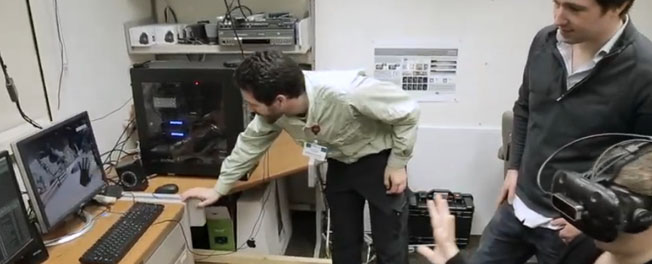
Lateralization, Movement and Plasticity Laboratory
General Laboratory Description
Dr. Philip directs the Lateralization, Movement and Plasticity (LAMP) Laboratory. The lab is engaged in translational science that bridges scientific discovery and rehabilitation via a two-pronged mission: understanding how the brain controls movement, especially for unimanual action; and applying that knowledge to improve rehabilitation of patients with nerve damage, stroke, or other motor disabilities. Under the direction of Dr. Philip, the lab explores the nature of human movement control and handedness.
- How is the brain organized and connected to support the specialization of the dominant hand (lateralization) for precision control of the hand and fingers?
- What brain changes (plasticity) support hand function after unilateral changes in the body and nervous system?
- How can we take advantage of these neurological and neurophysiological differences to improve rehabilitation for individuals with unilateral impairment of the dominant hand?
General Description of Student Activities
Students will have an opportunity to learn about the clinical research process, develop emerging research skills, and develop a greater understanding of the motor and rehabilitation neuroscience that underpins occupational therapy.
Students work collaboratively with Dr. Philip and other lab members on current research initiatives, attend regular lab team meetings, and gain an understanding of current lab initiatives and the peer-reviewed literature in this area of study. Students will participate in ongoing research projects, which may include training and application of behavioral and neuroscientific research techniques. As part of this process, students may have the opportunity to analyze clinical research data, discuss and review the scientific literature, or work with research participants including individuals with peripheral nerve injuries. Students will then gain experience collecting, organizing, and analyzing research data under the guidance and mentorship of Dr. Philip.
Examples of Projects
- Behavioral Impact of Nerve Injury: Identifying how peripheral nerve injuries affect hand usage and participation
- Precision Drawing and Handwriting Assessment: Developing new electronic assessment tools to predict handwriting performance and motor disabilities in children
- Interhemispheric Connectivity: Measure how neural connectivity between the cerebral hemispheres contributes to hand dominance
- Hand Choice: Identify how left/right hand choice behavior depends on injury, dexterity, brain mechanisms, and emotional concerns about use of the non-dominant hand
PhD Mentor Information
Dr. Philip's goal is to understand the neural bases of hand dominance and hand movements, and apply that understanding to improve rehabilitation for patients with impairments to their dominant hand. This line of research bridges the gap between basic, translational and clinical research by connecting our knowledge of brain mechanisms and physical function with rehabilitation concerns such as hand usage, activity participation, and quality of life.
Dr. Philip collaborates with faculty in Surgery, Neurology, Radiology, Orthopaedics, and Physical Medicine & Rehabilitation to work with patients who have peripheral nerve injuries, nerve transfers, amputations, or other conditions that alter function of the hand and arm. His laboratory combines human behavioral (sensory and motor) research techniques with neuroimaging and neuromodulation.
Research Foci
- Identifying the neural mechanisms (brain areas, connections, and networks) that support lateralized hand function, especially skilled performance with the non-dominant hand
- Determining how function of the dominant and non-dominant hand drive quality of life after dominant-hand impairment
- Identifying the neural and behavioral consequences of long-term forced use of one hand (due to e.g. amputation or peripheral nerve injury)
- Determining which physical and neurophysiological interventions will promote rehabilitation-relevant characteristics of non-dominant hand function
- Distinguishing between hand dominance and other lateralized mechanisms involved in control of the non-dominant hand
- Identifying the cortical plastic changes that support hand function and recovery after surgical repair or transfer of peripheral nerves
- Validating quantitative, automated, scalable methods to assess precision motor control of the hand and fingers

